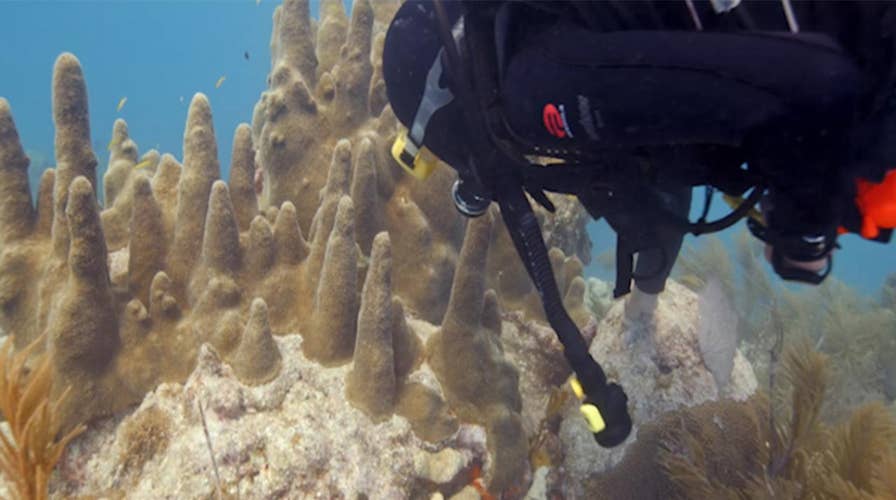Technicolor coral once covered stretches of underwater reefs in the Florida Keys and beyond
Scientists in Florida Keys are now spending 100 million to stop these reef deaths.
More than 90% of coral surveyed in the Great Barrier Reef this year was bleached, according to Australian government scientists.
This is the fourth such mass event in seven years.
NEW MEXICO WILDFIRES CAPTURED IN NASA SATELLITE IMAGES
This marks the first event during a La Niña weather pattern, which is associated with cooler Pacific Ocean temperatures.

In this photo supplied by the Great Barrier Reef Marine Park Authority (GBRMPA), a diver swims past coral on the Great Barrier Reef in Australia, Oct. 18, 2016. (M. Curnock/GBRMPA via AP)
The Great Barrier Reef Marine Authority said 91% of the areas surveyed were affected.
"The early indications are that the mortality won’t be very high," David Wachenfeld, chief scientist at the authority, said Wednesday.
"We are hoping that we will see most of the coral that is bleached recover and we will end up with an event rather more like 2020 when, yes, there was mass bleaching, but there was low mortality," he added.
EMPEROR PENGUINS AT RISK OF EXTINCTION
Heat stress that lasts more than a few weeks can lead the coral to die of starvation.
Scientists say bleaching in the world's largest coral reef ecosystem is caused by global warming
Last December was the hottest December the reef had experienced since 1900.
Warming also raises the risk of infectious diseases that can cause mass die-offs in coral, according to the National Oceanic and Atmospheric Administration (NOAA).

This photo supplied by the Great Barrier Reef Marine Park Authority (GBRMPA) shows reef scape of bleached coral in the Townsville/Whitsunday management area of the Great Barrier Reef in Australia, March. 15, 2015. (C. Jones/GBRMPA via AP)
NOAA noted that carbon dioxide absorbed into the ocean from the atmosphere has already begun to reduce calcification rates in reef-building and reef-associated organisms by altering seawater chemistry through decreases in pH.
CLICK HERE TO GET THE FOX NEWS APP
The Great Barrier Reef accounts for approximately 10% of the world's coral reef ecosystems; the network covers 348,000 square kilometers.
The Associated Press contributed to this report.










































